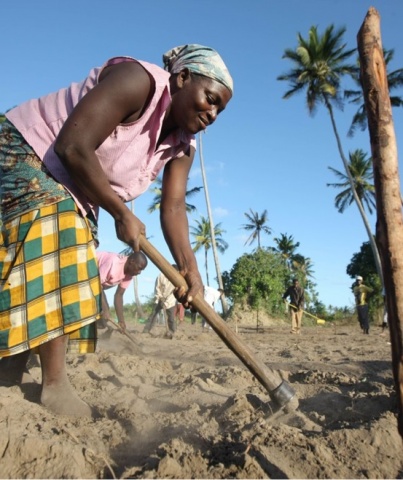
A raft of independent reports published this year, raise serious questions about economic instability and rising levels of poverty, particularly among low paid women. This new blog from the Centre for Global Education suggests how we can start to narrow the poverty gap and do development differently.
Oxfam has published its annual global economy report with the headline that ‘the combined wealth of the world’s 22 richest men is more than the wealth of all the women in Africa’. It seems that the neoliberal economy has not only created extreme inequality but is deeply sexist with the unpaid care work of millions of women and girls across the world estimated at $10.8 trillion annually. As Oxfam suggests ‘our economy would grind to a halt’ without unpaid social care but in a sexist global economy in which men own 50% more wealth than women, it goes unrewarded.
This raises the critical issue of how we measure development In a global economy subjected to the ‘tyranny of Gross National Product (GNP)’. The dominance of GNP as a measure of development means that the critically important unpaid work of women lacks the monetary value of many harmful sectors to society such as gambling and extractive industries. Speaking at the University of Kansas in 1968, United States’ presidential candidate, Bobby Kennedy, said of GNP:
“It measures neither our wit nor our courage, neither our wisdom nor our learning, neither our compassion nor our devotion to our country, it measures everything in short, except that which makes life worthwhile”.
Another market crash
Perhaps the most alarming recent report on global poverty has come from the International Monetary Fund – one of the chief advocates of neoliberalism - when it’s Managing Director, Kristalina Georgieva, compared the current global economy to the “roaring 1920s” that preceded the market crash of 1929. She highlighted particular concerns at growing levels of inequality within countries, and singled out the UK, where “the top 10% now control nearly as much wealth as the bottom 50%”. She said that “excessive inequality hinders growth and ... can fuel populism and political upheaval”.
Over the past year, the world has witnessed an upsurge in street activism in response to austerity economics, corruption, failing public services and neoliberalism. Seven out of 10 people live in countries where the wealth gap is growing. Between 2011 and 2017 average wages in G7 countries increased by 3%, while dividends to wealthy shareholders grew by 31% in real terms, an Oxfam G7 report has found. It adds that a corporate fixation on delivering for shareholders combined with stagnating wages and real decline has meant the share of workers at risk of poverty in the world’s wealthiest countries has increased.
And poverty and inequality could be propelled to even greater levels because of the accelerating climate emergency, particularly in the global South. Up to 122 million people could fall into poverty by 2030 solely because of climate change, the UN’s World Social Report warns. As with poverty in general, it’s women and girls who’ll be hit hardest by the climate emergency – threats to food and water supplies and increased sickness are ‘already placing a greater burden on women’, according to Oxfam.
Doing development differently
Given the dire predictions from a chorus of reports authored by a range of development stakeholders arising from a continued adherence to neoliberalism, an alternative path to social wellbeing is urgently needed. Here are five proposals that could help steer the world toward a more sustainable and just future.
- Tax the rich: According to Oxfam, ‘Taxing an additional 0.5% of the wealth of the richest 1% over the next 10 years is equal to investments needed to create 117 million jobs in education, health and elderly care and other sectors, and to close care deficits’. This is economic common sense and should be implemented with urgency.
- Close Corporate tax havens: Low income economies lost more to illicit financial flows than they received in aid in 2019. According to the United Nations, tax havens cost low-income countries $200 million which is more than the $150 million they received in aid. Many of these tax havens are controlled by wealthy countries, including the UK, which Christian Aid says should end ‘its shameful role in tax avoidance’.
- Create legislation to protect carers: Governments should introduce legislation to protect care workers and ensure that they are paid a living wage with attendant rights. Half of domestic workers have no limit on their working hours and don’t receive the minimum wage. This needs to stop.
- Invest in public services: Under-funded public services hit the poor hardest, particularly women. Lack of access to clean water, electricity, child care and education limit the life opportunities of women. An increased tax base could support public services that benefit all of society and narrow the gender gap.
- Re-thinking development: When it comes to global development, the ‘elephant in the room’ is the role played by neoliberalism in accelerating the climate crisis and driving inequality. We need to move beyond the neoliberal concept of ‘development’ to a model that is socially equitable, sustainable and infused with social justice and human rights. The alternative is more economic polarisation and a deepening climate emergency.
Stephen McCloskey is Director of the Centre for Global Education





